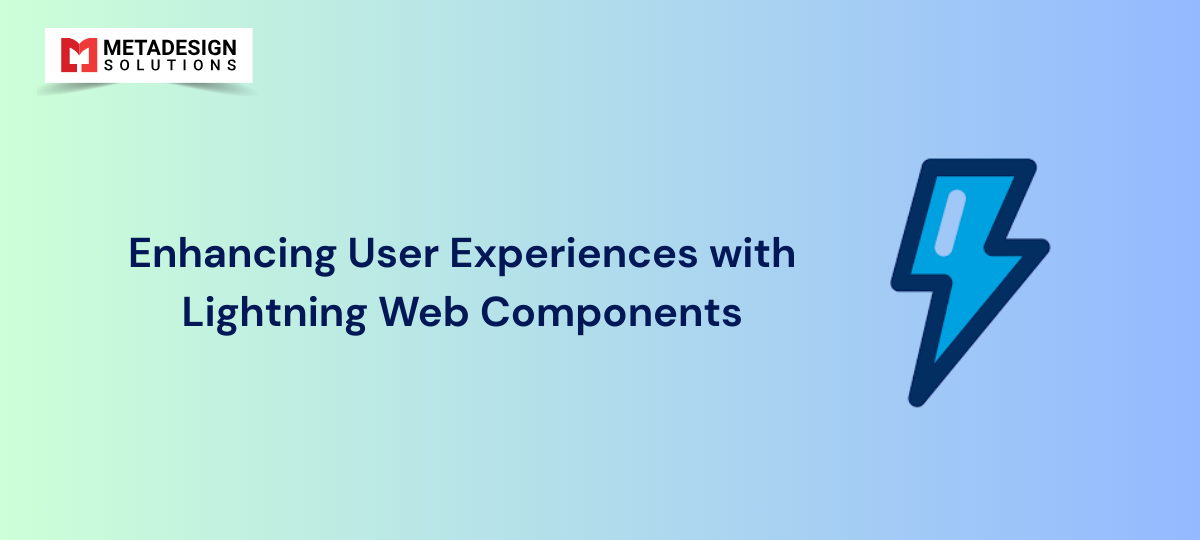In today’s digital age, users expect seamless and responsive web experiences. Salesforce’s Lightning Web Components (LWC) framework enables developers to build modern, high-performance user interfaces. Having worked extensively with LWC since its inception, I’m excited to share how it can revolutionize your Salesforce applications.
At MetaDesign Solutions, our team of seasoned Salesforce developers is adept at leveraging LWC to create intuitive and engaging user experiences. With over 400 engineers and a decade of experience, we’re committed to helping businesses harness the full potential of Salesforce technologies.
Understanding Lightning Web Components
Lightning Web Components is a modern JavaScript framework built on web standards. It allows developers to create reusable components with enhanced performance and better alignment with modern web development practices.
Key Advantages:
- Performance: Faster loading times and improved runtime performance.
- Standards-Based: Utilizes modern web standards like Shadow DOM and Custom Elements.
- Reusable Components: Build components that can be reused across applications.
What’s New in LWC?
Salesforce continually enhances LWC with new features:
- Dynamic Interactions: Components can communicate without wiring through Apex or events.
- Lightning Message Service (LMS): Simplifies communication between components and even Visualforce pages.
- Enhanced Accessibility: Improved support for ARIA attributes and keyboard navigation.
Building a Responsive Component: A Practical Example
Let’s create a responsive data table component that displays account information.
Step 1: Set Up Your Development Environment
- Salesforce CLI: Ensure you have the latest version installed.
- VS Code with Salesforce Extensions: For efficient development.
Step 2: Create the LWC Component
bash code:
sfdx force:lightning:component:create -n accountDataTable -d force-app/main/default/lwc
Elevate Your Salesforce UI with LWC
Ready to enhance your Salesforce applications? Schedule a consultation to explore how Lightning Web Components can deliver fast, responsive user experiences tailored to your business needs.
Step 3: Develop the Component (accountDataTable.js)
javascript code:
import { LightningElement, wire } from 'lwc';
import getAccounts from '@salesforce/apex/AccountController.getAccounts';
export default class AccountDataTable extends LightningElement {
accounts;
error;
@wire(getAccounts)
wiredAccounts({ error, data }) {
if (data) {
this.accounts = data;
this.error = undefined;
} else if (error) {
this.error = error;
this.accounts = undefined;
}
}
}
Step 4: Create the HTML Template (accountDataTable.html)
html code:
<template>
<lightning-card title="Accounts">
<template if:true={accounts}>
<lightning-datatable
data={accounts}
columns={columns}
key-field="Id"
></lightning-datatable>
</template>
<template if:true={error}>
<p>{error}</p>
</template>
</lightning-card>
</template>
Step 5: Define the Columns (accountDataTable.js)
javascript code:
columns = [
{ label: 'Account Name', fieldName: 'Name' },
{ label: 'Industry', fieldName: 'Industry' },
{ label: 'Annual Revenue', fieldName: 'AnnualRevenue', type: 'currency' }
];
Step 6: Create the Apex Controller (AccountController.cls)
apex code:
public with sharing class AccountController {
@AuraEnabled(cacheable=true)
public static List<Account> getAccounts() {
return [SELECT Id, Name, Industry, AnnualRevenue FROM Account LIMIT 50];
}
}
Step 7: Deploy and Test
Deploy the component and Apex class to your org and add the component to a Lightning page.
Step 8: Make It Responsive
Use CSS to ensure the data table adapts to different screen sizes.
accountDataTable.css
css code:
:host {
display: block;
}
Best Practices
- Performance Optimization: Use @AuraEnabled(cacheable=true) for Apex methods to enable client-side caching.
- Reusable Components: Design components to be configurable and reusable.
- Styling: Use SLDS (Salesforce Lightning Design System) for consistent styling.
Overcoming Challenges
Working with LWC may introduce new challenges:
- Learning Curve: Developers may need time to adapt to modern JavaScript and web standards.
- Browser Compatibility: While LWC supports modern browsers, ensure your target audience is using compatible versions.
- Debugging: Utilize browser developer tools and Salesforce’s debugging tools for troubleshooting.
How MetaDesign Solutions Can Assist
Our team is proficient in developing advanced LWC components tailored to your business needs.
Our Offerings:
- Custom Development: Build components that enhance user engagement.
- Migration Services: Transition from Aura components to LWC for better performance.
- Training: Provide workshops to upskill your team in LWC development.
- Consultation: Offer guidance on best practices and architectural decisions.
A Client Success Story
We partnered with an e-commerce company looking to improve their customer portal.
Challenge: The existing portal was slow and unresponsive, leading to a poor user experience.
Solution: We redesigned the portal using LWC, creating dynamic and responsive components that improved load times and usability.
Result: User engagement increased by 35%, and customer satisfaction scores improved significantly.
The Future of User Interfaces in Salesforce
Embracing LWC positions your business to take advantage of future innovations in web technology.
Let’s Elevate Your User Experience
Enhance your Salesforce applications with Lightning Web Components (LWC) for fast, responsive user experiences. Explore best practices and Salesforce CRM customization services with our expert team. Contact us at sales@metadesignsolutions.com to get started!
Related Keyphrase:
#LightningWebComponents #LWC #Salesforce #SalesforceLWC #UserExperience #SalesforceDevelopment #SalesforceUX #WebComponents #LightningComponents #UIUXDesign #SalesforceLightning #LWCDevelopment #SalesforceCustomization #WebAppDevelopment #SalesforcePlatform #TechForSalesforce #SalesforceInnovations #LWCExperts #SalesforceAppDevelopment #AppDevelopment #UserInterface #UXDesign #SalesforceLightningExperience #ComponentBasedDesign #SalesforceCommunity



